Sewage spills a threat to lough's 'hero' mussels
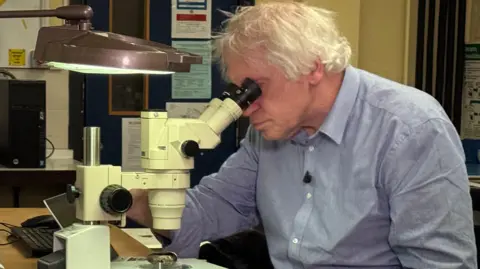 BBC
BBCA blue mussel may not be the first thing that springs to mind when it comes to Northern Ireland's water quality heroes.
But for scientist Matt Service at the Agri-Food and Biosciences Institute (AFBI), they are "little ecosystem water treatment plants on their own".
In Belfast Lough where the mussels are cultivated, regular sewage spills are threatening the environment, the economy and public health, according to a report by NI Water.
Officials say the lough is facing a crisis if investment in sewage infrastructure is not increased.
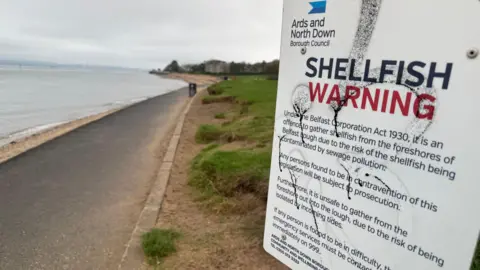
'Vital natural resource'
In the report, titled The Story of Belfast Lough, a senior NI Water official outlines the strain the "vital natural resource" is under and what is required to restore and protect it.
Paddy Brow, the head of the Living With Water Programme (LWWP) at NI Water, wrote the report.
"Really, 90% of the excess bacteria we have in Belfast Lough are coming from discharges controlled by Northern Ireland Water," he said.
"It's also eutrophic, which means it's likely to have the same algae blooms that happen in Lough Neagh because there's too much nutrients.
"And we know that discharges from Northern Ireland Water are responsible for over 50% of that."
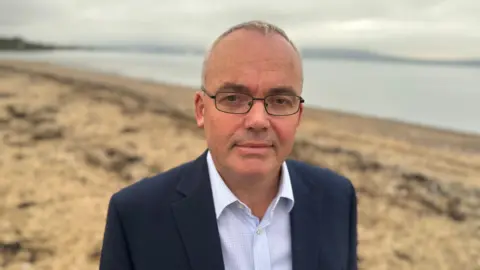
Drainage in Belfast was originally designed by Victorian engineers as a combined system, with both sewage and storm water flowing through the same pipes.
That was due to the shape of the city, sitting at the bottom of hills at near-sea level.
There are 270 combined storm overflows in the Greater Belfast area, where Mr Brow said there should only be "about 30 to 50".
Some of those along the shores of Belfast Lough discharge more than 200 times a year.
That means anything that goes into the toilet could end up in the lough.
"Please do not flush anything which is not pee, poo and paper," said Mr Brow.
"Our toilets should not be used as a bin.
"We should have the systems that are able to keep things in the sewer when they're flushed, but we don't."
Fatbergs
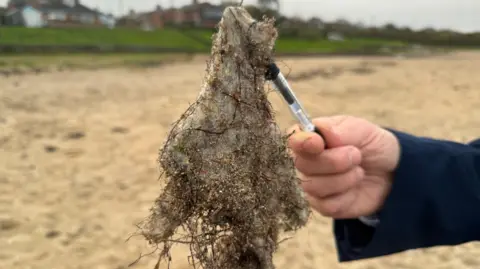
Sanitary products, food wrappers like crisp bags, condoms, oil and grease from cooking, and - possibly worst of all - wet wipes are the major culprits for causing strain on the sewage system.
Mr Brow said most wet wipes contain plastic, which can cause serious problems.
"When people flush the toilet, the solids settle to the bottom of the pipes.
"The fat combines with wet wipes and they make things called fatbergs."
That, combined with the "first flush" when rain starts, means engineers are always on standby.
The biggest pumping station in Northern Ireland, Sydenham Wastewater Pumping Station, is where vans are sent every time it rains in order to stop overflows becoming blocked.
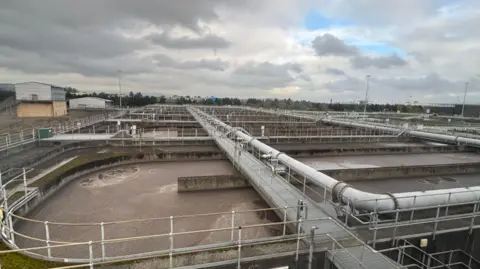
Mr Brow said ageing infrastructure and lack of budget for upgrades are placing a constraint on the development of Belfast as "the driving part" of the economy.
"It's got a real need for social housing, and those houses can't get built at the moment, and that's a real issue."
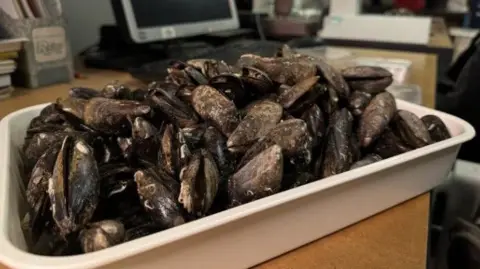
Scientists say spills are putting pressure on a shellfish industry that was largely closed at the turn of the 20th Century due to sewage contamination.
In the 1990s, mussel beds were set up in the inner lough and a shellfish water protected area set up.
"There are up to three or four thousand tonnes of mussels in the lough. There are about 18 mussels to a kilogram, each filters 1.5 litres of water an hour," said Dr Matt Service, who heads a team monitoring shellfish and toxic algae at AFBI.
"So you can start to do the sums - effectively, the water in the lough gets turned over by shellfish every 14 days."
The mussels feed on nutrients and algae in effluent from wastewater treatment plants, which makes them vital for maintaining water quality.
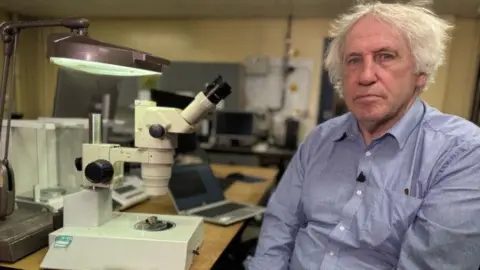
Dr Service is concerned further pollution could affect the industry.
"These inner beds are tending to be what's called a Class C, so that means they can't really be marketed readily, whereas the outer beds are still a Class B and can go to market, mainly to Holland.
"But if you've got increasing areas or increasing episodes of Class C, it would become uneconomic to maintain these beds and because they are artificial beds, they would disappear."
He added: "This feedback loop would begin where mussels are not there to filter the water, and the water quality would begin to decrease."
'No domestic water charges'
Stormont's Infrastructure Minister John O'Dowd recently said the funding model for NI Water is fit for purpose, a claim disputed by a construction industry body.
On Thursday, a spokesperson for the Department for Infrastructure told BBC News NI that Mr O'Dowd was "referring to the governance model" and not the amount of funding NI Water currently receives.
"As with all public services there is a need for additional funding, and the minister continues to make the case for this, recently securing an additional £31m for the company," they added.
"Other governance models suggested to date involve the introduction of domestic water charges.
"The minister has repeatedly made his position clear. He will not introduce domestic water charges.”
Next week, Spotlight investigates the Belfast Lough sewage pollution scandal – exposing who’s responsible for putting people and jobs at risk. Spotlight – Tuesday 3 December on iPlayer and BBC One NI at 22.40 GMT.
